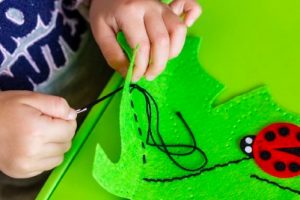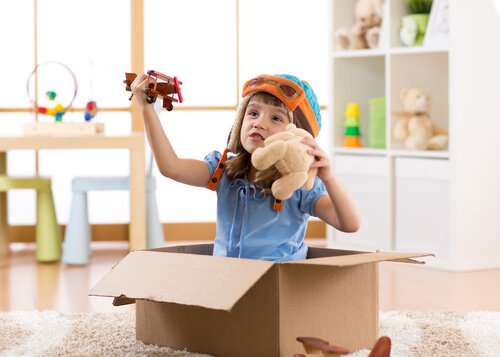DIY Toys: Guaranteed Fun for Your Children

DIY toys offer a host of advantages. They can encourage your child’s creativity, entertain them without using technology, and get them interested in the environment. They can also save you some money.
In this article, we’ll give you a few good ideas to get started making your own DIY toys.
DIY toys: guaranteed fun
Would you like your kids to play with toys they made themselves? Do you want to teach them something about recycling and caring for the environment. Do you find it ridiculous to spend a ton of money on toys they’ll get bored with immediately?
If you answered yes to any of these questions, then DIY toys are for you. In addition to the benefits listed above, they also provide a great opportunity to spend a fun afternoon as a family, leaving aside screens and technology. Here are some quality options:
1. Castle and rockets made from cardboard tubes
Paper towels contain cardboard tubes that often go to waste. If you collect some, as well as the ones inside toilet paper rolls, you can make DIY toys for both boys and girls.
For example, you can make a fairytale castle. Simply take three or four tubes and cut them to different sizes. Then, make the roofs using a cardboard or paper cone and paste. Finally, paint them as though they were brick or concrete walls.
Meanwhile, rockets require a cardboard tube, a paper cone, and a cardboard base. You can paint them however you like, or decorate them with colored paper and paste.

2. Puppets and marionettes
Small children find puppet shows highly entertaining. But what if they could be responsible for creating the story’s characters and then put on a show for the whole family?
To make puppets, you can use old gloves and socks, adding eyes and hair made from cardboard and wool, respectively. If you want to make a marionette, you’ll also need yarn, a stick or branch, cardboard, and glue.
The process is fairly simple. First, make the shape of the character you want, making sure to affix the thread to the arms and legs. Then, attach the stick to the other end. As a result, the marionette will come alive when you move the strings.
3. Geometric shapes and colors
Depending on your child’s age, you can teach him or her colors, numbers, letters and even shapes using wonderful DIY toys. You don’t even need that many materials to do it.
For instance, you can make geometric shapes out of thick cardboard. Then, paint cards the same color as the shapes. Lastly, ask your little one to identify the matching pairs. He or she will learn by playing.
4. Fishing game
With a little imagination and creativity, you can make some great games for your kids. One example is fishing using cloth fish. Start by cutting the fish shapes out of colored fabrics. It’s quite simple.
Then, attach a “loop” of wool representing the fish’s mouth. For the rod, you need a stick, some thread, and a hook made from a paperclip (or something similar) at the tip.
Finally, place the fish on the ground. The child, standing or sitting on a chair, must catch them by hooking the clip into the wool loop. This game offers hours of fun!

DIY toys are suitable for any age. It’s simply a matter of seeing what you have at home and letting your imagination run free.
We recommend keeping a box or bag to store these materials. You can break it out on a rainy afternoon when the usual games and toys aren’t grabbing your kids’ attention.
What should you save? Plastic bottles, lids, cardboard, thread, boxes, colored paper, buttons… basically everything that would go to waster but can be recycled. Your children will love the chance to do something different, and you can help them make the toys and play together as a family.
Without a doubt, DIY toys are a great idea for creating a world filled with adventures. They also give your kids the opportunity to enjoy something they made themselves. If they’re very young, find the right time to make the toys for them, and surprise them with a terrific gift.
DIY toys offer a host of advantages. They can encourage your child’s creativity, entertain them without using technology, and get them interested in the environment. They can also save you some money.
In this article, we’ll give you a few good ideas to get started making your own DIY toys.
DIY toys: guaranteed fun
Would you like your kids to play with toys they made themselves? Do you want to teach them something about recycling and caring for the environment. Do you find it ridiculous to spend a ton of money on toys they’ll get bored with immediately?
If you answered yes to any of these questions, then DIY toys are for you. In addition to the benefits listed above, they also provide a great opportunity to spend a fun afternoon as a family, leaving aside screens and technology. Here are some quality options:
1. Castle and rockets made from cardboard tubes
Paper towels contain cardboard tubes that often go to waste. If you collect some, as well as the ones inside toilet paper rolls, you can make DIY toys for both boys and girls.
For example, you can make a fairytale castle. Simply take three or four tubes and cut them to different sizes. Then, make the roofs using a cardboard or paper cone and paste. Finally, paint them as though they were brick or concrete walls.
Meanwhile, rockets require a cardboard tube, a paper cone, and a cardboard base. You can paint them however you like, or decorate them with colored paper and paste.

2. Puppets and marionettes
Small children find puppet shows highly entertaining. But what if they could be responsible for creating the story’s characters and then put on a show for the whole family?
To make puppets, you can use old gloves and socks, adding eyes and hair made from cardboard and wool, respectively. If you want to make a marionette, you’ll also need yarn, a stick or branch, cardboard, and glue.
The process is fairly simple. First, make the shape of the character you want, making sure to affix the thread to the arms and legs. Then, attach the stick to the other end. As a result, the marionette will come alive when you move the strings.
3. Geometric shapes and colors
Depending on your child’s age, you can teach him or her colors, numbers, letters and even shapes using wonderful DIY toys. You don’t even need that many materials to do it.
For instance, you can make geometric shapes out of thick cardboard. Then, paint cards the same color as the shapes. Lastly, ask your little one to identify the matching pairs. He or she will learn by playing.
4. Fishing game
With a little imagination and creativity, you can make some great games for your kids. One example is fishing using cloth fish. Start by cutting the fish shapes out of colored fabrics. It’s quite simple.
Then, attach a “loop” of wool representing the fish’s mouth. For the rod, you need a stick, some thread, and a hook made from a paperclip (or something similar) at the tip.
Finally, place the fish on the ground. The child, standing or sitting on a chair, must catch them by hooking the clip into the wool loop. This game offers hours of fun!

DIY toys are suitable for any age. It’s simply a matter of seeing what you have at home and letting your imagination run free.
We recommend keeping a box or bag to store these materials. You can break it out on a rainy afternoon when the usual games and toys aren’t grabbing your kids’ attention.
What should you save? Plastic bottles, lids, cardboard, thread, boxes, colored paper, buttons… basically everything that would go to waster but can be recycled. Your children will love the chance to do something different, and you can help them make the toys and play together as a family.
Without a doubt, DIY toys are a great idea for creating a world filled with adventures. They also give your kids the opportunity to enjoy something they made themselves. If they’re very young, find the right time to make the toys for them, and surprise them with a terrific gift.
All cited sources were thoroughly reviewed by our team to ensure their quality, reliability, currency, and validity. The bibliography of this article was considered reliable and of academic or scientific accuracy.
- Garcia, A., & Llull, J. (2009). El juego infantil y su metodología. Madrid: Editex.
- Instituto de consumo de Extremadura. Un juguete para cada edad. Extraído de: https://saludextremadura.ses.es/filescms/incoex/uploaded_files/CustomContentResources/UN_JUGUETE_PARA_CADA_EDAD.pdf
- AIJU. (2019). Juego y juguete 2019/2020 – Guía AIJU. AIJU, Instituto Tecnológico de Producto Infantil y Ocio. https://guiaaiju.com/guias/Guia-AIJU-2019-20.pdf
This text is provided for informational purposes only and does not replace consultation with a professional. If in doubt, consult your specialist.








